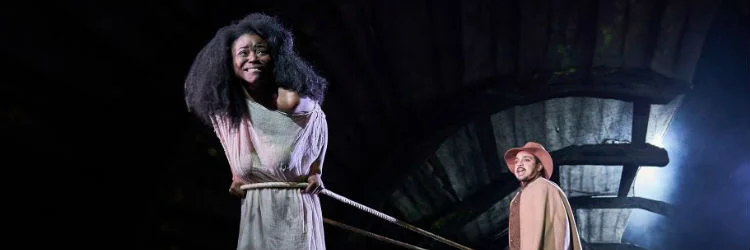Review - Faustus: That Damned Woman at the Lyric Hammersmith
London is already awash with major re-workings of classic texts, whether nudged into contemporary verse and attitude (Cyrano de Bergerac at the Playhouse), modern dress and language (Uncle Vanya at the Harold Pinter) or undergoing wholesale cultural re-orientation (Three Sisters at the National, relocated to Nigeria). Now, most radically or playfully of all, depending on how receptive you are to it, the Faustian myth is re-dramatised here in a re-gendered version, which signals its intentions in its title of "Faustus That Damned Woman" and propels its title character on a journey through some 144 years of life (an extension that she's bought at the expense of her soul).
As she re-writes her own personal history and that of women generally, it's like a combination of Dr. Who's ability to travel across time and Christopher Marlowe's (whose 1592 version of the story is still one of its most famous).
Of course, it is always fascinating to view familiar stories through a different historical lens, and following Lucy Kirkwood's The Welkin that opened at the National just last week, here's another female playwright being given a large London stage to tell a woman's story. The Lyric Hammersmith's artistic director Rachel O'Riordan and executive director Sian Alexander write in a programme note that the theatre has "committed, with Headlong, to commission women writers to create new plays of scale for our Main House."
But as with The Welkin, ambition outstrips actual achievement. The story is told by playwright Chris Bush in a style that is alternately abstract and episodic, literal and poetic. As we enter the theatre, there's an off-putting smell of sulfur in the air: maybe we're being subconsciously lured to hell already, or it's just a still-freshly decorated set. But within minutes of the play starting, Faustus is being visited by apparitions being summonsed from her past, as she watches her mother being tried for witchcraft (there are echoes here of The Crucible).
But soon she'll be making different choices for herself, driven by her own understanding of her (lack of) female agency. As Bush writes in the programme, "As a young woman of low birth in 17th-century London, she has no wealth and little agency. By the time she meets Lucifer she knows he cannot be trusted, but sees his offer as the least-worst option available to her. Faustus sells her soul in order to control her destiny and to achieve a degree of autonomy that would've otherwise been impossible. Her sex and social class also affect how she's able to use her newfound powers, and through this, That Damned Woman becomes an examination of how we treat women who pursue greatness."
As a male critic, I'm infinitely aware that there's a danger of this review being turned into an examination of how men treat women who aspire to that greatness or their desire to tell great stories. But a piece of theatre can only be judged on its own terms of whether it engages its audience or not. Despite a highly atmospheric production by Caroline Byrne, and lively performances by a seven-strong cast spiritedly led by Jodie McNee in the title role, I found myself mostly at a distance (and not just because I was seated in row M). Partly its the Faust story itself: it's not meant to be taken literally, of course, but with its time-travelling shifts of pace and place, it's difficult to care what actually happens to her. But there's also something muddled and muted in the storytelling here. As much as I wanted to embrace it, its stridency kept pushing me away.
Faustus: That Damned Woman is at the Lyric Hammersmith to 22nd February.
Faustus: That Damned Woman tickets are available now.
Photo credit: Manuel Harlan
Originally published on
